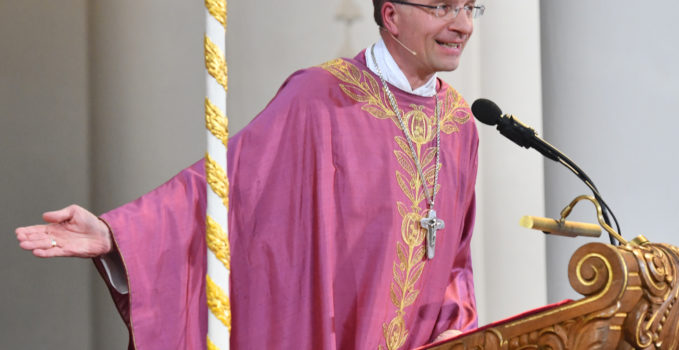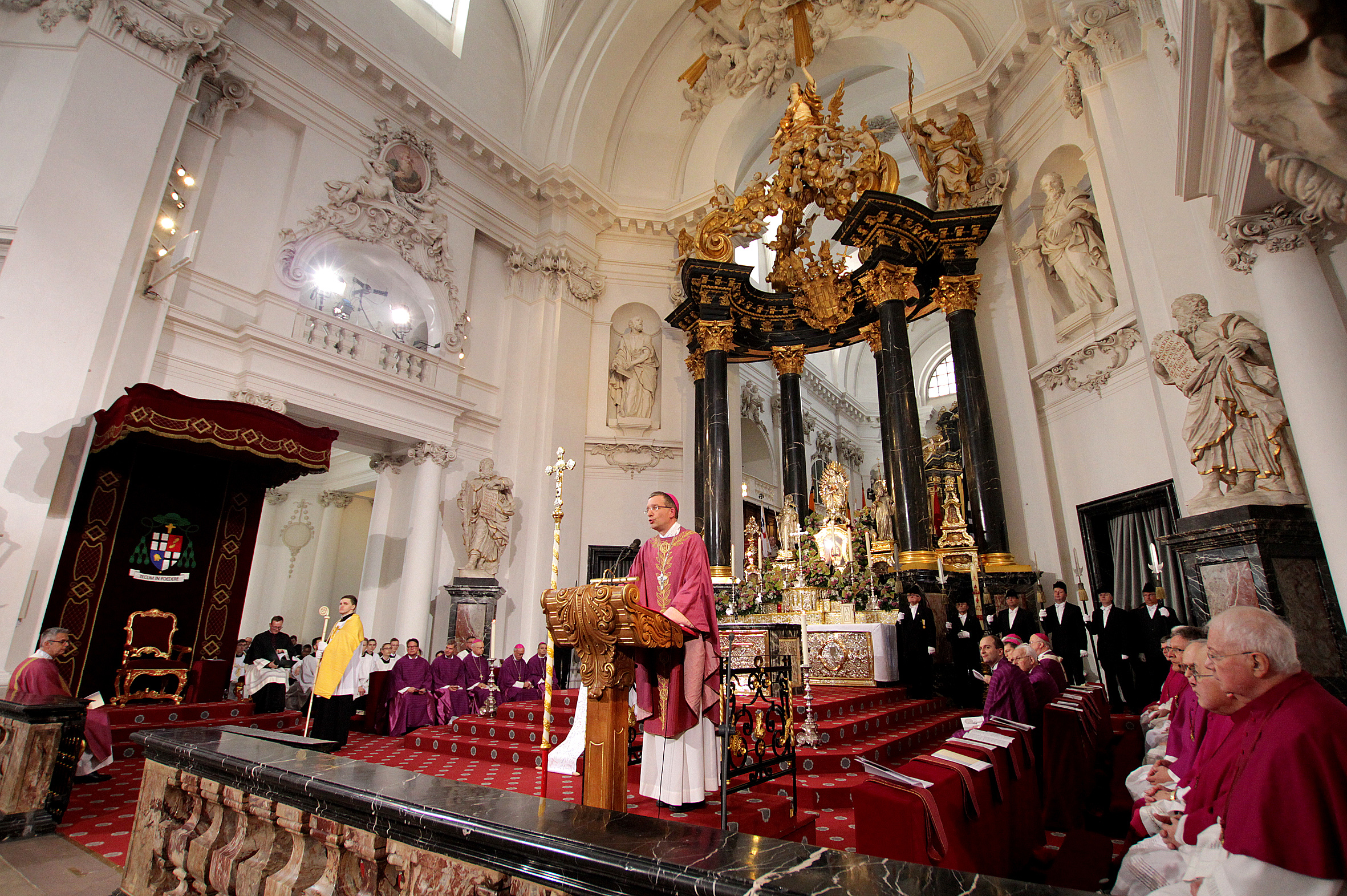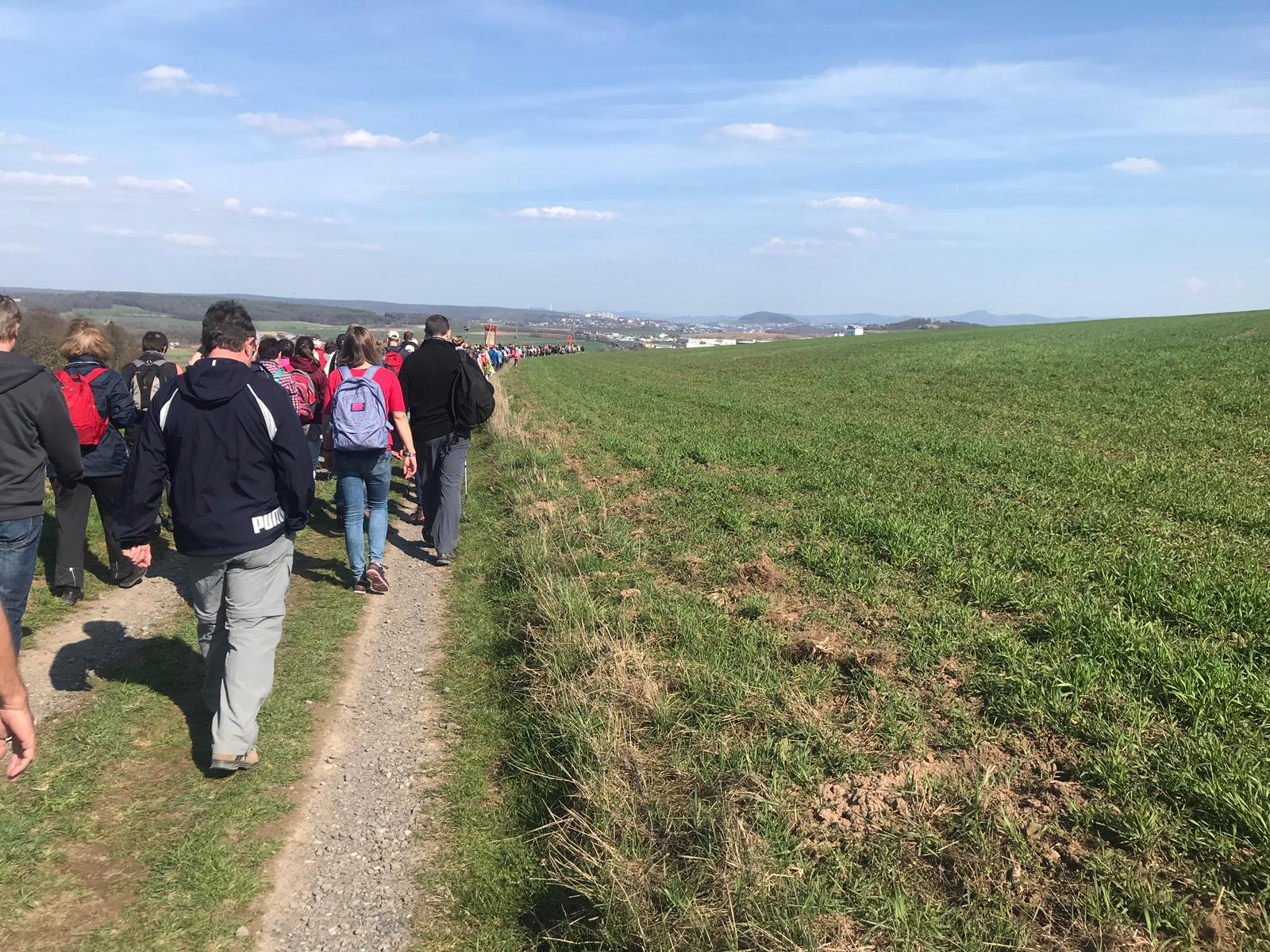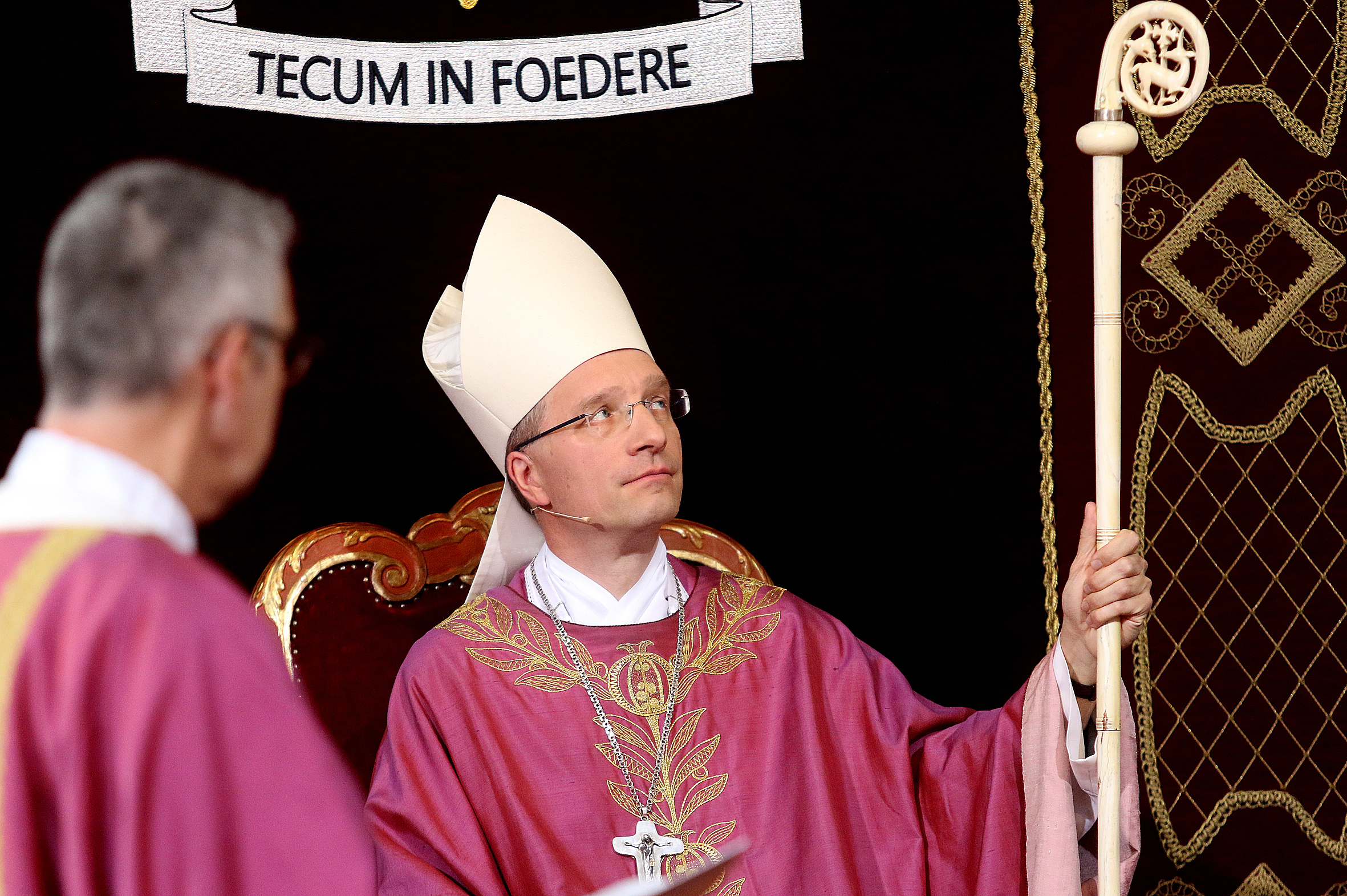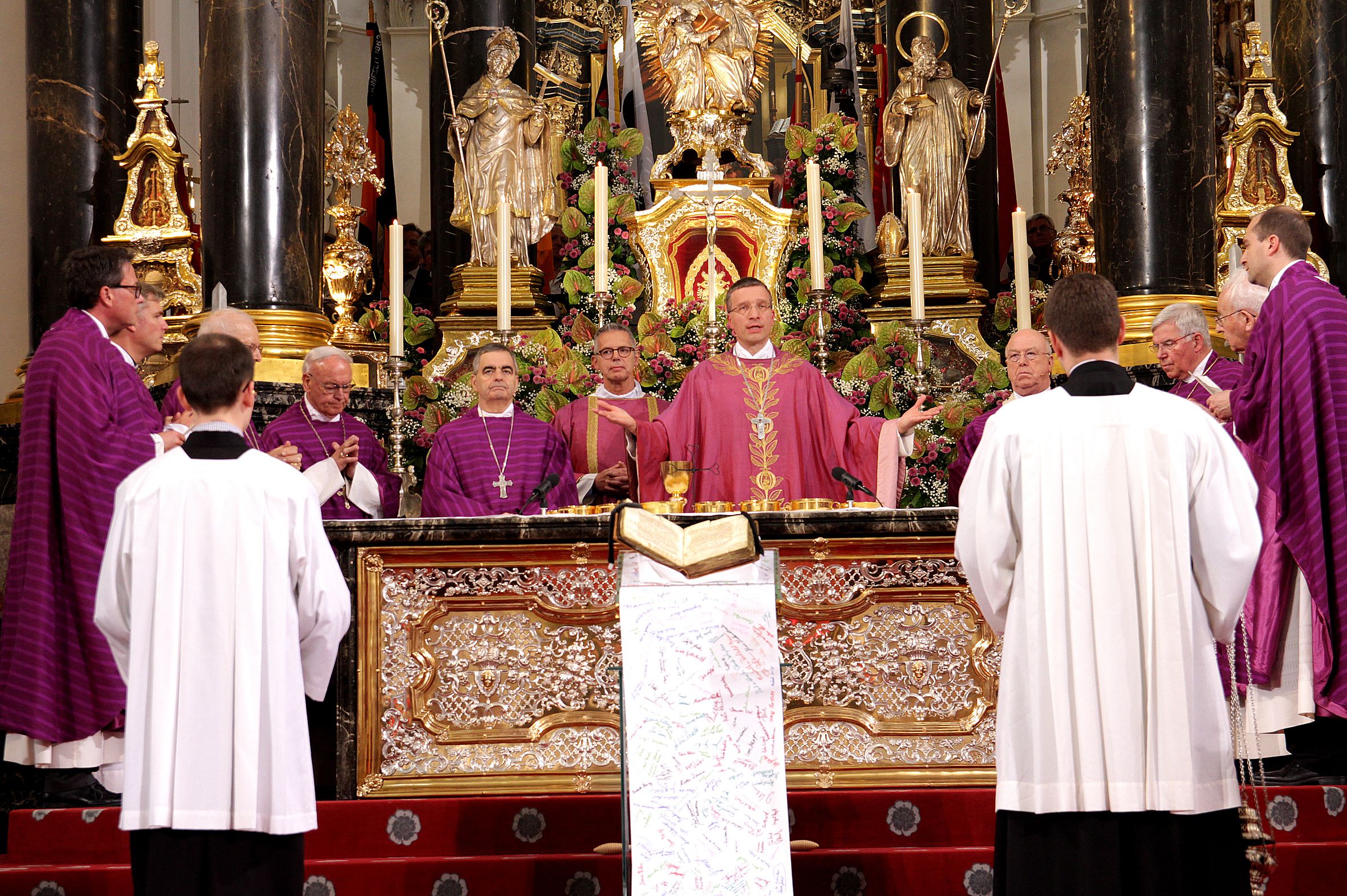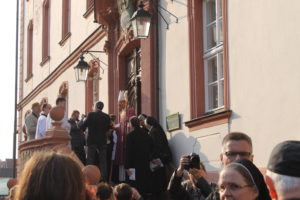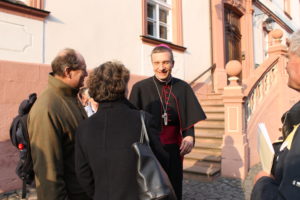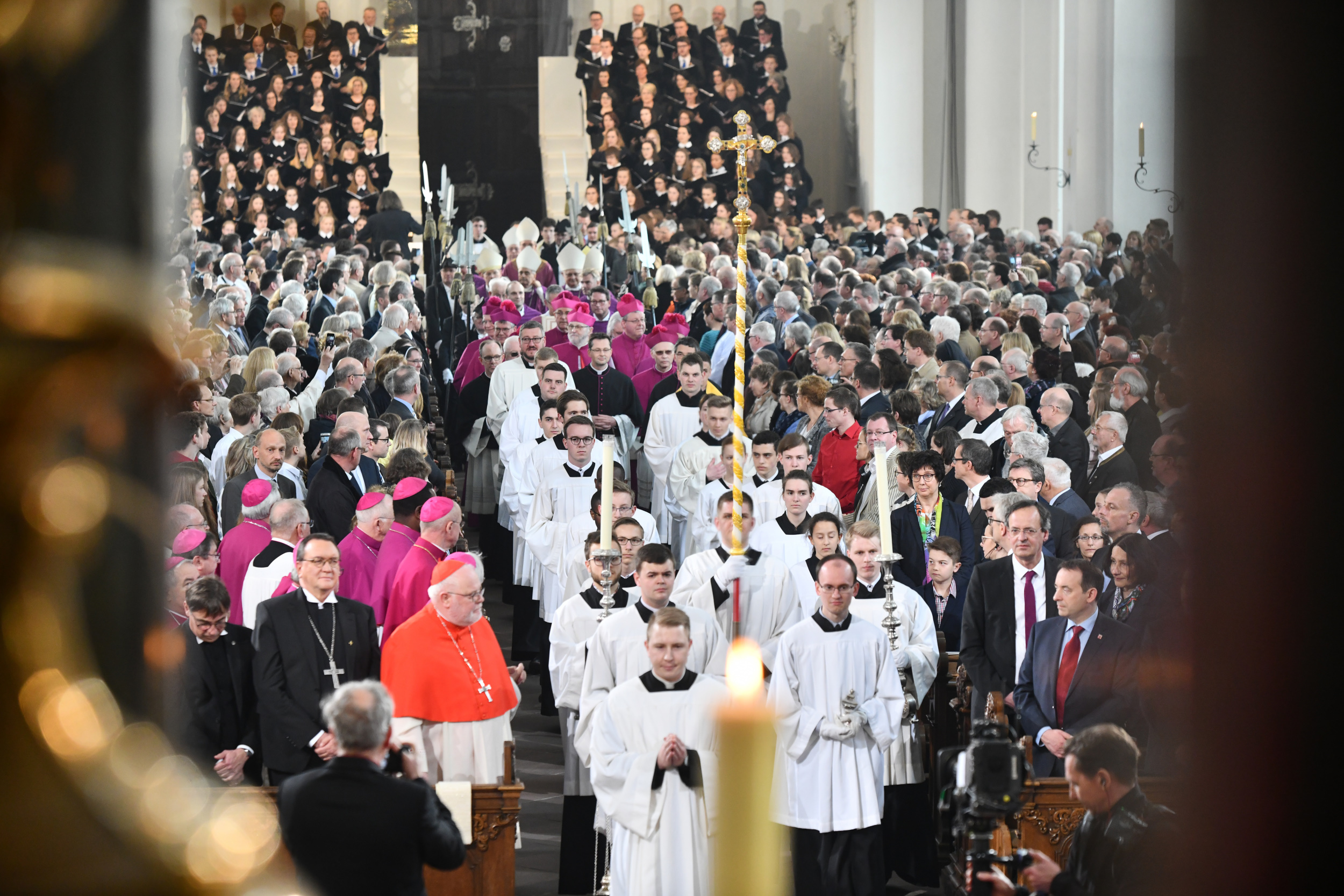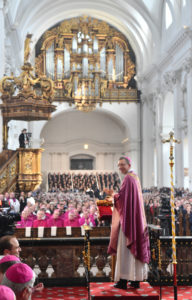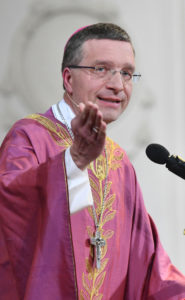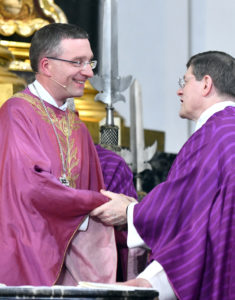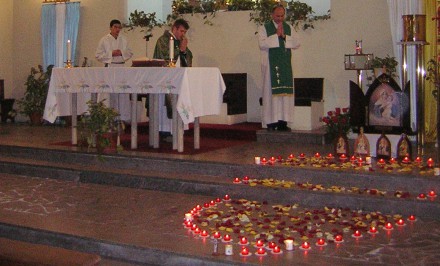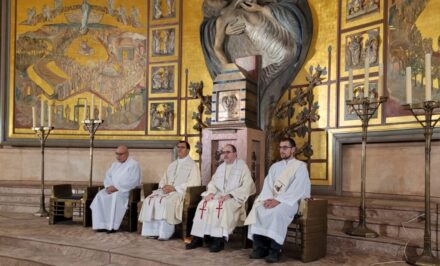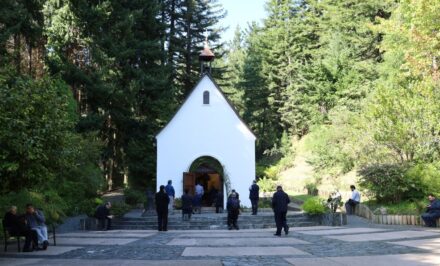GERMANY, Maria Fischer •
During a solemn Pontifical High Mass in the packed Fulda Cathedral on Sunday, 31 March 2019, Bishop Dr Michael Gerber (49) was inaugurated into his office as spiritual leader of the Diocese of Fulda by the competent Metropolitan, Archbishop Hans-Josef Becker (Paderborn). Two thousand people took part in the Mass in and around the Fulda Cathedral, among them many members of the Schoenstatt Movement in the diocese of Fulda and from all over Germany and beyond. Schoenstatters from Austria, Bolivia, USA and Argentina followed the ceremonies livestreamed by H3.—
A Pilgrim Church
A pilgrim Church, wide open spaces, closeness to the people: Values that Pope Francis has proclaimed and lived for six years in the Church. These are values that Bishop Dr Michael Gerber, whose spiritual home is with Fr Joseph Kentenich, also lives and values. Shortly before he took office, Bishop Gerber, the pilgrim, was accompanied by about a thousand people on his two-day pilgrimage along the “Boniface Route”, especially on Saturday when he arrived in his diocese. As Cardinal Reinhard Marx, the President of the German Bishops’ Conference, emphasised in his words of congratulation, he went on foot. A bishop has to walk with his people, sometimes in the lead, sometimes in their midst, and also sometimes at the back, in order to take along also those who have lost contact, but always in such a way that he can really hear what moves people.
Among those who accompanied the new Bishop on his pilgrimage were many Schoenstatters from Fulda, the Archdiocese of Freiburg and even from Switzerland. Melanie and Ulrich Grauert said, “Last night when we arrived our feet were really sore. Very sore! But it was a powerful experience!” Crowned by a brief encounter on the way and a personal word of congratulation to the new Bishop directly after the Pontifical High Mass.
Rejoicing in God’s covenant with us
Long before the start of the solemn inauguration, the richly symbolic cathedral of Fulda with its grave of St Boniface, which stands for the start of the Christian faith in Germany, was packed with people. Many others gradually gathered in the nearby parish churches and the Cathedral Square in radiant sunshine and an icy wind. Led by the banners of the associations active in the Fulda Diocese, as well as Schoenstatt banners on the shoulders of young people, the Cathedral Chapter and those in liturgical service, Bishop Michael Gerber entered the Cathedral. There he was awaited by over thirty bishops, among them Emeritus Archbishop Dr Robert Zollitsch from his home diocese in the Archdiocese of Freiburg, who like him is a member of the Schoenstatt Institute of Diocesan Priests.
The Papal Nuncio, Archbishop Dr Nikola Eterović, presented the letter of appointment to Dean Prof. Dr Werner Kathrein, who then showed it to the members of the Cathedral Chapter. Cathedral Chaplain, Fr Thomas Renze, as the youngest member of the Cathedral Chapter, read out a German translation of the Latin document. Archbishop Becker presented the ancient bishops’ crosier of the Abbots and Bishops of Fulda, dating from the 12th century, to Bishop Gerber and accompanied the new bishop to his Cathedra, or bishop’s throne. The new bishop then sat down and in this way “took possession” of his diocese.
The nuncio then addressed the new bishop, “On behalf of the Bishop of Rome, who ‘has the primacy of love’ (Ignatius of Antioch, Letter to the Romans, greeting) I wish you, dear Excellency, through the intercession of the blessed Virgin Mary, the Thrice Admirable Mother, Queen and Victress, of St Boniface the patron of this diocese and apostle of the Germans, of St Sturmius, the first Abbot in Fulda, and St Elizabeth of Hungary, who spent her last years in Marburg, everything of the best and God’s rich blessings on your pastoral service. Led by the Holy Spirit, may you carry it out in the best way, and lead Christians to rejoice in the faith by bearing personal witness to the Catholics and all living in the diocese of Fulda of that joy in God’s covenant with his people that is eternally valid and will grant eternity to all who want to believe it.” With that the Nuncio proclaimed the episcopal motto of Dr Michael Gerber: Tecum in foedere – In covenant with you. It stands out over the episcopal see and the life of the new bishop. The covenant of love with Mary, a covenant culture, God’s covenant with his people, that calls and enables us to enter into a covenant with peoples and cultures, a covenant with creation and with every human being. All this is included in those three, simple words. It is a huge programme for life and the Church, and is expressed in the bishop’s crosier showing two hands reaching out to each other. It indicates that representatives of the People of God reach out to the new bishop. It also explicitly shows that the newly baptised and catechumens are included as personified joy in the covenant with God.
Tell one another about how God has touched us
“What matters is to open up a space, to enable relationships through which people can enter into a personal relationship with Jesus Christ and his Gospel. What matters is that, as a result of this relationship with Christ, people are able to tackle the challenges of their lives, so that they do not break under them, but instead grow. What matters is that out of this relationship to Christ people are able to form human relationships that are truly human, and in this way set their stamp on our culture and this planet.
Precisely at a time when contrasts are again more strongly emphasised, when those seem to gain the upper hand who preach isolation, and who erect walls; precisely in this time we are challenged to again accept responsibility for our planet. We have to see this responsibility in such a way that it opens up our horizons to take in their worldwide dimensions and hence also their global context. “You have set my feet in a spacious place” (Ps 31, 8 NIV). Let us not be afraid of the wide open spaces into which the Lord wants to place us.”
These were the words of Bishop Gerber in his sermon, during which he spoke just as clearly and urgently about the catastrophe of priests abusing minors. He pointed out clearly that the renewal of the Church can only take place through our very personal contact with Jesus Christ – “together”. Together we have to enter into the depths of mutual, spiritual inspiration:
“Boniface was a man who was profoundly touched by the Gospel – right up to the last minutes of his life. The Codex Ragnydrudis, which has been placed before the altar today, testifies to this. Which words from the Sacred Scriptures have touched me, touched my heart? Which events in my life have helped me to grow? Where do we find an echo of these moments when we were touched?
… When we gather in our committees and circles, groups or privately, our attitude, our attentiveness, is meant to create an area where, besides the many things that always have to be clarified and discussed, we can tell one another about such points of growth, such key experiences. From time to time we will grow precisely through those experiences that caused us pain. Where and with whom does this find a response?
Where and how does the path and fate of other people find a response in me? … Where and how do we come into real contact with the lives of other people?”
A young couple from the Schoenstatt Movement introduced this to their parish, and it changed the whole parish. They got it from Kentenich, as did Gerber, as did the IKAF, as did schoenstatt.org. … It is very simple and practical. From it there arises a network, a pilgrim community, without which Bishop Gerber said he would not be able to follow his path through life.
Overcoming the fear of the unthinkable, of what has not been done before
After the warm words of congratulation by Cardinal Marx, Bishop Dr Martin Hein of the Evangelical Church of Kurhessen-Waldeck and the Evangelical Church in Hesse and Nassau, and Cultural Minister Dr Lorz, the representative of the Prime Minister of Hesse, who was ill, the new bishop gave his blessing and thanked all who had come and those who had taken part. A large crowd of people then made their way to the garden of the nearby Seminary. Along the way they greeted the new bishop and one another. The words of the sermon accompanied them, encouraging them not to be afraid of the wide open space into which God had placed them, even those these wide open spaces lead the Church and us Christians into what was formerly unthinkable, in order to arrive at where Jesus Christ needs us today – with the people and the depths of their relationship to him. An experience on the road to Fulda became such an encounter.
Hardly three hundred meters from me on the two-lane Autobahn thick, black smoke rose into the air. The Satnav showed that we were only two kilometres from the next exit. A vehicle was on fire. It took some time for the first fire engine to reach us along the rescue lane. It was followed by five more. The air was still filled with smoke and people were still afraid. Then a police car arrived from the opposite direction and gave a brief order over the loudspeaker: All had to turn; the traffic would be diverted. When I had almost managed to turn my car, a driver near me sounded his horn and gesticulated. Then he turned down his window and shouted, “I’m phoning the police, you’re driving the wrong way!” Many turned and drove off. Some had such big cars that they couldn’t turn them. Others couldn’t imagine how they were to travel in the wrong direction on the Autobahn, even though they had been told to do so by the highest authorities. We had to do the unthinkable and carry on if we were to reach our goal. We got there by a different route and in a different way. That is the Church in 2019. That is Pope Francis, who challenges us to drive along the rescue lane. With Amoris Laetitia, with mercy, with solidarity with migrants, prisoners, the homeless … On the radio I later heard that it had taken till 6 p.m. to clear the Autobahn and repair the road, which had been damaged by the heat. Possibly some people were still stuck there.
When I arrived in Fulda shortly before 3 p.m., much later than I had planned, I was no longer able to enter the Cathedral, not even though I was a journalist. In front of the large screen outside I met David Brähler, whom I hadn’t seen for years. Driving the wrong way on the Autobahn – and I was meant to be just here at that moment.
Sermon – Bishop Dr. Michael Gerber – complete text
Photos: Arnulf Müller, Ralph Leupold (Press Pool), Ulrich Grauert, Maria Fischer
Original: German, 31.03.2019. Translation: Mary Cole, Manchester, UK


